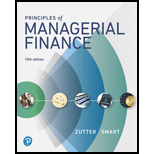
Concept explainers
a)
To discuss:
Actual return of portfolio.
Introduction:
Portfolio return: In financial context; portfolio return is seen as percentage that represents the profit on a portfolio of investments.
b)
To discuss:
Average returns
Introduction:
Return: In financial context, return is seen as percentage that represents the profit in an investment.
Portfolio refers to a set of financial investments such as debentures, stocks, bonds and mutual funds owned by the investor.
c)
To discuss:
Standard deviation.
Introduction:
Risk: The risk can be defined as the uncertainty attached to an event such as investment where there is some amount of risk associated to it as there can be either gain or loss.
The standard deviation measures the volatility of the stock. It measures in absolute terms the dispersion of asset risk around its mean.
d)
To discuss:
Correlation of assets.
e)
To discuss:
Benefits of diversification by creation of portfolio.
Introduction:
Portfolio refers to a set of financial investments such as debentures, stocks, bonds and mutual funds owned by the investor.
Want to see the full answer?
Check out a sample textbook solution
Chapter 8 Solutions
Gitman: Principl Manageri Finance_15 (15th Edition) (What's New in Finance)
- The term 'beta' in stock market analysis measures: A) The total value of a company’s stocks B) A stock’s sensitivity to the overall market C) The dividend yield of a stock D) A stock’s price-to-earnings ratioarrow_forwardPlease don't use chatgpt The term 'beta' in stock market analysis measures: A) The total value of a company’s stocks B) A stock’s sensitivity to the overall market C) The dividend yield of a stock D) A stock’s price-to-earnings ratio i wiilarrow_forwardDo not use ChatGPT! Which of the following best describes the concept of leverage in finance? A) Using borrowed funds to increase the potential return on investment B) Reducing risk by diversifying assets C) A method to avoid paying taxes D) Increasing the company’s profit marginarrow_forward
- Which of the following best describes the concept of leverage in finance? A) Using borrowed funds to increase the potential return on investment B) Reducing risk by diversifying assets C) A method to avoid paying taxes D) Increasing the company’s profit marginarrow_forwardI need help in this question! What is a major feature of a 'fixed-rate bond'? A) The interest rate changes with market conditions B) The bond pays a fixed interest rate throughout its life C) The principal is not repaid until maturity D) The bond can be converted into stockarrow_forwardWhich of the following best describes the concept of leverage in finance? A) Using borrowed funds to increase the potential return on investment B) Reducing risk by diversifying assets C) A method to avoid paying taxes D) Increasing the company’s profit margin i need help!arrow_forward
- What is a major feature of a 'fixed-rate bond'? A) The interest rate changes with market conditions B) The bond pays a fixed interest rate throughout its life C) The principal is not repaid until maturity D) The bond can be converted into stockarrow_forwardDon't use ChatGPT! Which of the following is a form of equity financing? A) Bank loan B) Issuance of common stock C) Bonds D) Trade creditarrow_forwardWhich of the following is a form of equity financing? A) Bank loan B) Issuance of common stock C) Bonds D) Trade creditno aiarrow_forward
- In which of the following situations would a company most likely issue bonds? A) When it needs to raise short-term capital B) When it wants to increase its working capital C) When it seeks long-term financing D) When it wants to buy back its own shares Need help!arrow_forwardI need answer for this question! In which of the following situations would a company most likely issue bonds? A) When it needs to raise short-term capital B) When it wants to increase its working capital C) When it seeks long-term financing D) When it wants to buy back its own sharesarrow_forwardIn which of the following situations would a company most likely issue bonds? A) When it needs to raise short-term capital B) When it wants to increase its working capital C) When it seeks long-term financing D) When it wants to buy back its own sharesarrow_forward
 Essentials Of InvestmentsFinanceISBN:9781260013924Author:Bodie, Zvi, Kane, Alex, MARCUS, Alan J.Publisher:Mcgraw-hill Education,
Essentials Of InvestmentsFinanceISBN:9781260013924Author:Bodie, Zvi, Kane, Alex, MARCUS, Alan J.Publisher:Mcgraw-hill Education,

 Foundations Of FinanceFinanceISBN:9780134897264Author:KEOWN, Arthur J., Martin, John D., PETTY, J. WilliamPublisher:Pearson,
Foundations Of FinanceFinanceISBN:9780134897264Author:KEOWN, Arthur J., Martin, John D., PETTY, J. WilliamPublisher:Pearson, Fundamentals of Financial Management (MindTap Cou...FinanceISBN:9781337395250Author:Eugene F. Brigham, Joel F. HoustonPublisher:Cengage Learning
Fundamentals of Financial Management (MindTap Cou...FinanceISBN:9781337395250Author:Eugene F. Brigham, Joel F. HoustonPublisher:Cengage Learning Corporate Finance (The Mcgraw-hill/Irwin Series i...FinanceISBN:9780077861759Author:Stephen A. Ross Franco Modigliani Professor of Financial Economics Professor, Randolph W Westerfield Robert R. Dockson Deans Chair in Bus. Admin., Jeffrey Jaffe, Bradford D Jordan ProfessorPublisher:McGraw-Hill Education
Corporate Finance (The Mcgraw-hill/Irwin Series i...FinanceISBN:9780077861759Author:Stephen A. Ross Franco Modigliani Professor of Financial Economics Professor, Randolph W Westerfield Robert R. Dockson Deans Chair in Bus. Admin., Jeffrey Jaffe, Bradford D Jordan ProfessorPublisher:McGraw-Hill Education





